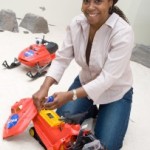 Since the creation of the wheel, we’ve been in a cycle of developing technology and then competing with it for work. Yes, we use what we invent to make our tasks go more efficiently, and then we’ve needed to compete with our inventions in order to remain productive ourselves.
Since the creation of the wheel, we’ve been in a cycle of developing technology and then competing with it for work. Yes, we use what we invent to make our tasks go more efficiently, and then we’ve needed to compete with our inventions in order to remain productive ourselves.
We’re feeling shortchanged here — wasn’t technology supposed to help us relax more?
Today the cycle of change and adaptation seems to be accelerating, so we’re increasingly being prompted to evaluate our competitive advantage as humans. A preposterous and humiliating prospect, to be sure, yet hope is not elusive. In his Op-Ed piece “The Start-Up of You,” Thomas Friedman writes in the New York Times:
Something new — something that will require our kids not so much to find their next job as to invent their next job — is influencing today’s job market more than people realize.
In discussing the trends of unemployment, and the need to access the full extent of our abilities, he continues:
[Employers are] deploying more automation technologies, software, outsourcing, robotics — anything they can use to make better products with reduced head count and health care and pension liabilities. That is not going to change. And while many of them are hiring, they are increasingly picky. They are all looking for the same kind of people — people who not only have the critical thinking skills to do the value-adding jobs that technology can’t, but also people who can invent, adapt and reinvent their jobs every day, in a market that changes faster than ever.
We’ve been freaking out about this idea for a while now; it’s partly what has led us to start this blog. Friedman is talking about how we need to leverage everything we have inside us to solve the significantly complex problems we face as we move into the future.
How do we tap into the universe of knowledge, skills, and abilities inside each of us? Keep reading Whole Wide Work. As you do, you’ll learn about the specific parts of our selves that we conceal, usually to fit in at work. While we may feel accepted in the short term, hiding creates many problems for us and our colleagues in the long-term.
So to compete with the proliferation of machines around us, (subscribe to WWW, above right, and) show us who you are — warts and all. The less time you spend covering up, the more energy you’ll have to demonstrate your wonderfully human capacities.
Image via




Pingback: Come Out at Work: As Atheist | Whole Wide Work